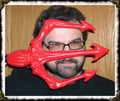
I got this email from a very successful and critically acclaimed mystery novelist I know (who gave me permission to post this as long as I removed his or her name):
How can you be friends with Joe Konrath? He’s the anti-Christ. In his own way, he is as bad or worse than Lori Prokop. The advice he gives to aspiring writers is just terrible and, worse, he’s doing everything he can to undermine his fellow professionals. How, you ask? He’s perpetuating the myth that you should devote all or part of your advance to promotion, that you should devote yourself to making sure that the publisher makes money (even if it costs you). What he’s doing is legitimizing the damaging corporate mindset that authors should pay for their own promotion without any investment or reimbursement from the publisher. We’re supposed to live off our advances, not kick them back to the publisher for advertising and promotion. Joe’s latest moronic blog post was so infuriating I almost put my fist into my laptop screen. Of course his publisher loves him. But professional writers should fear him. He’s cancer.
After getting this email, I had to scoot right over to Joe’s blog to see what had pissed off my usually low-key buddy so much. I think this is it:
My writing philosophy is simple: Make money for your publisher.
I do this by not only doing a lot of self-promotion, but by also
considering my audience even before I sit down to write a single word.
This means compromises. This means understanding the system writing
exists in (the publishing business) and weighing it against the many
reasons I wanted to become a writer.
Successful writers seem to understand this balance, and the
trade-offs required. They realize that their books are products as well
as art.
By ‘successful’ I mean that they are making money for their
publisher. You don’t have to be an NYT bestseller to do this. All you
have to do is earn out your advance.
You can earn out your advance by doing a lot of self-promotion, by
working closely with your publisher, by spending a lot of your advance
money on marketing, and by writing good books.
Let me start by saying I really like Joe. I think he’s funny, gracious, multi-talented, and genuinely interested in helping his fellow writers. We don’t always agree, but that’s okay by me — I don’t always agree with my wife, either, but we still love each other. Sure, I disagree with Joe from time to time, but that doesn’t diminish my respect for him or how much I enjoy his company.
I’ve always been awed by the incredible time and energy Joe puts into promoting his books. He visited something like 200 booksstores for "drop in" signings during a promotional tour which, I believe, was paid for by his publisher. He does an amazing job getting his work noticed and I applaud him for it.
That said, I don’t agree with his frequently expressed philosophy that your job as an author is to make money for your publisher and pump your advance into promotion. It’s nice if you’re in the financial position to do that (it’s what I did with many of my books), but most authors aren’t. They write to support their families and, from a business stand-point, it isn’t cost-effective for them to donate a significant portion of their advances to their publisher.
Joe frequently talks about how important it is to promote your books and assure that each title earns out. For those not in the biz, "earning out" simply means that you’ve sold enough books to earn back the advance against royalties that the publisher paid you. That doesn’t mean that once you hit that point you are making tons of money, it just makes it more likely the publisher will buy your next book.
I agree that authors need to promote themselves and their work…and that you need to earn out if you’re going to survive in this business. But the publishers have a responsibility to do more than merely publish and distribute the book. They also have to advertise and promote. They can’t expect the author to shoulder most of that burden.
Or can they? More and more, it seems, publishers are expecting authors to use their advances for promotion, pay for their own websites, and send themselves on tour … and if they don’t, they are seen as being "unsupportive" and "difficult to work with." And that is scary, especially with the midlist disappearing and advances shrinking. The advance is supposed to support an author while he works, not act as a replacement for corporate spending on advertising and promotion…it is NOT a replacement for the publisher’s advertising budget.
But if authors like my friend Joe keep advocating that it’s the author’s responsibility to devote some or all of their advance for promotion, and authors and publishers buy into that thinking, we will see publishers spending less on advertising and promotion and earnings for authors shrinking even more.
I’m NOT saying authors shouldn’t promote their work — God knows, I certainly work hard to promote myself (take this blog, for instance). But I have to admit that Joe’s "What have you done for your publisher today?" attitude often makes me cringe. He makes up for it my making me laugh a lot, and with his many keen insights into the biz, so it evens out.
Your thoughts?
UPDATE: Joe has responded in the comments below and also shares his views on his blog.
Read more



